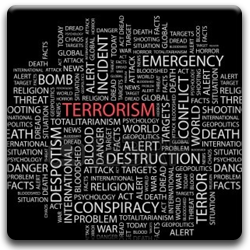Terrorism
 Terrorism
Terrorism
Most terrorist incidents in the United States have been bombing attacks, involving detonated and undetonated explosive devices, tear gas and pipe and fire bombs.
The effects of terrorism can vary significantly from loss of life and injuries to property damage and disruptions in services such as electricity, water supply, public transportation and communications.
One way governments attempt to reduce our vulnerability to terrorist incidents is by increasing security at airports and other public facilities. The US government also works with other countries to limit the sources of support for terrorism.
WHAT IS TERRORISM?
Terrorism is the use of force or violence against persons or property in violation of the criminal laws of the United States for purposes of intimidation, coercion or ransom.
Terrorists often use threats to create fear among the public, to try to convince citizens that their government is powerless to prevent terrorism, and to get immediate publicity for their causes.
The Federal Bureau of Investigation (FBI) categorizes terrorism in the United States as one of two types–domestic terrorism or international terrorism.
Domestic terrorism involves groups or individuals whose terrorist activities are directed at elements of our government or population without foreign direction.
International terrorism involves groups or individuals whose terrorist activities are foreign-based and/or directed by countries or groups outside the United States or whose activities transcend national boundaries.
Biological And Chemical Weapons
Biological agents are infectious microbes or toxins used to produce illness or death in people, animals or plants. Biological agents can be dispersed as aerosols or airborne particles. Terrorists may use biological agents to contaminate food or water because they are extremely difficult to detect. Chemical agents kill or incapacitate people, destroy livestock or ravage crops. Some chemical agents are odorless and tasteless and are difficult to detect. They can have an immediate effect (a few seconds to a few minutes) or a delayed effect (several hours to several days).
Biological and chemical weapons have been used primarily to terrorize an unprotected civilian population and not as a weapon of war. This is because of fear of retaliation and the likelihood that the agent would contaminate the battlefield for a long period of time. The Persian Gulf War in 1991 and other confrontations in the Middle East were causes for concern in the United States regarding the possibility of chemical or biological warfare. While no incidents occurred, there remains a concern that such weapons could be involved in an accident or be used by terrorists.
Did You Know…
- On February 29, 1993, a bombing in the parking garage of the World Trade Center in New York City resulted in the deaths of five people and thousands of injuries. The bomb left a crater 200 by 100 feet wide and five stories deep. The World Trade Center is the second largest building in the world and houses 100,000 workers and visitors each day.
- The Department of Defense estimates that as many as 26 nations may possess chemical agents and/or weapons and an additional 12 may be seeking to develop them.
- In recent years the largest number of terrorist strikes have occurred in the Western States and Puerto Rico. Attacks in Puerto Rico accounted for about 60 percent of all terrorist incidents between 1983 and 1991 that occurred on United States territory.
- The Central Intelligence Agency reports that at least ten countries are believed to possess or be conducting research on biological agents for weaponization.
Terrorism In The United States
In the United States, most terrorist incidents have involved small extremist groups who use terrorism to achieve a designated objective. Local, State and Federal law enforcement officials monitor suspected terrorist groups and try to prevent or protect against a suspected attack. Additionally, the US Government works with other countries to limit the sources of support for terrorism.
A terrorist attack can take several forms, depending on the technological means available to the terrorist, the nature of the political issue motivating the attack, and the points of weakness of the terrorist’s target. Bombings are the most frequently used terrorist method in the United States. Other possibilities includes an attack at transportation facilities, an attack against utilities or other public services or an incident involving chemical or biological agents.
Terrorist incidents in this country have included bombings of the World Trade Center in New York City, the United States, the Capitol Building in Washington, DC and Mobil Oil corporate headquarters in New York City.
